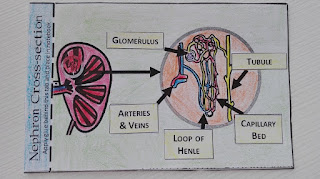DIABETIC NEOPHROPATHY
Nephropathy means kidney disease or damage. Diabetic nephropathy is damage to your kidneys caused by diabetes. In severe cases it can lead to kidney failure.
What causes diabetic nephropathy?
The kidneys have many tiny blood vessels that filter waste from your blood. High blood sugar from diabetes can destroy these blood vessels. Over time, the kidney isn't able to do its job as well. Later it may stop working completely. This is called kidney failure.
Certain things make you more likely to get diabetic nephropathy. If you also have high blood pressure or high cholesterol, or if you smoke, your risk is higher. Also, Native Americans, African Americans, and Hispanics (especially Mexican Americans) have a higher risk.
What are the symptoms?
There are no symptoms in the early stages. So it's important to have regular urine tests to find kidney damage early. Sometimes early kidney damage can be reversed.
As your kidneys are less able to do their job, you may notice swelling in your body, most often in your feet and legs.
How is it treated?
The main treatment is medicine to lower your blood pressure and prevent or slow the damage to your kidneys. These medicines include:
- Angiotensin-converting enzyme inhibitors, also called ACE inhibitors.
- Angiotensin II receptor blockers, also called ARBs.
As damage to the kidneys gets worse, your blood pressure rises. Your cholesterol and triglyceride levels rise too. You may need to take more than one medicine to treat these complications.
And there are other steps you can take. For example:
- Keep your blood sugar levels within your target range. This can help slow the damage to the small blood vessels in the kidneys.
- Work with your doctor to keep your blood pressure under control. Your doctor will give you a goal for your blood pressure. Your goal will be based on your health and your age. An example of a goal is to keep your blood pressure below 140/90.
- Keep your heart healthy by eating healthy foods and exercising regularly. Preventing heart disease is important, because people with diabetes are more likely to have heart and blood vessel diseases. And people with kidney disease are at an even higher risk for heart disease.
- Watch how much protein you eat. Eating too much is hard on your kidneys. If diabetes has affected your kidneys, limiting how much protein you eat may help you preserve kidney function. Talk to your doctor or dietitian about how much protein is best for you.
- Watch how much salt you eat. Eating less salt helps keep high blood pressure from getting worse.
- Don't smoke or use other tobacco products.


